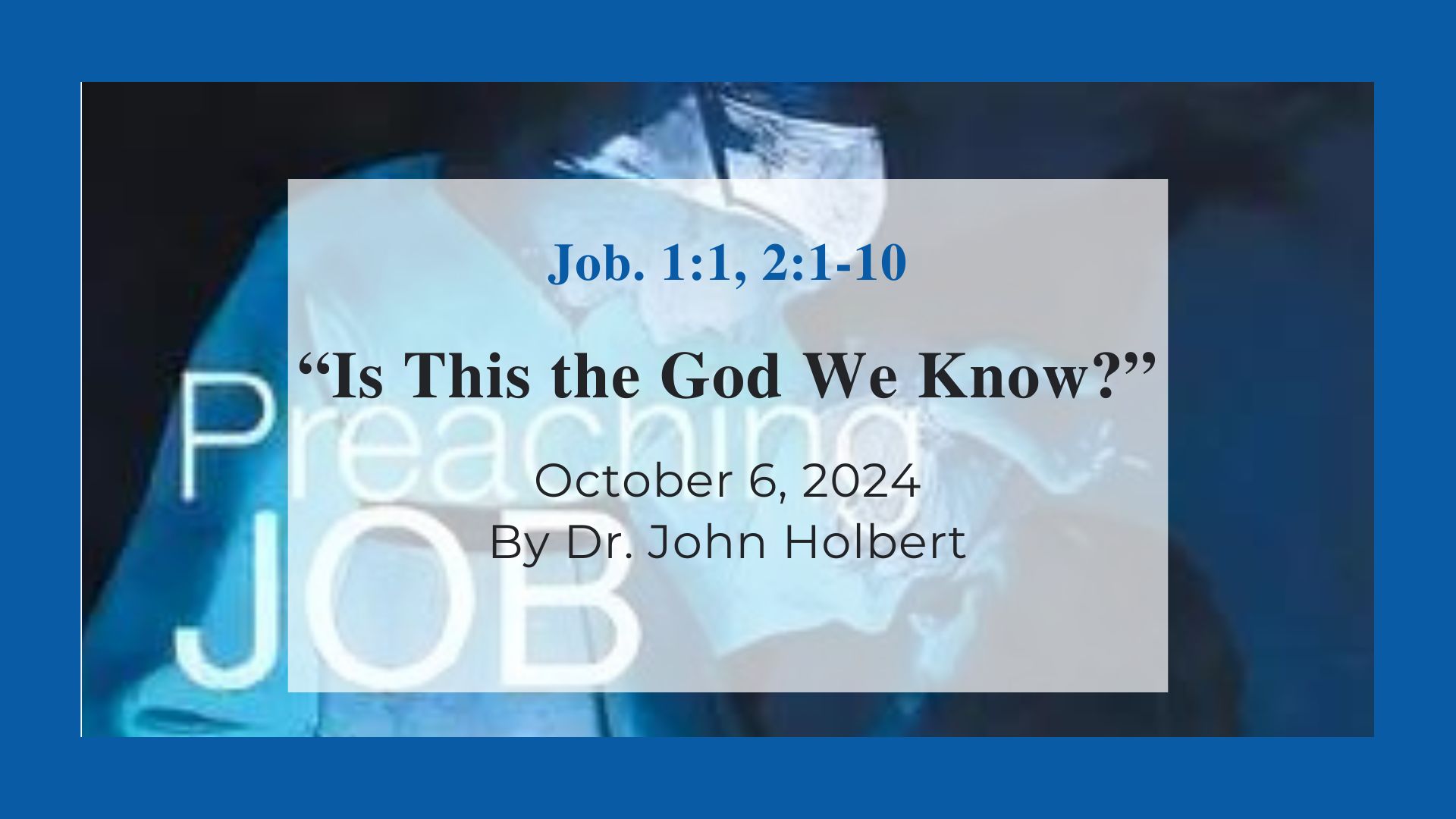Is This the God We Know? - Reflections on Job 2, Proper 22 Year B
by John Holbert on Monday, September 30, 2024

Proper 22. October 6, 2024. Job. 1:1, 2:1-10. “Is This the God We Know?”
As any of you know who have read my stuff for any length of time, I have given a large portion of my scholarly life of 50 years to the book of Job. I wrote a long dissertation on the book in 1974, after spending an entire school year reading all 42 chapters of the book in Hebrew with a professor who himself wrote a dissertation on the book in 1959. I have written several articles and one book with Job as subject, and if one thing might be said, I remain certain just how uncertain I am about the book’s ultimate concerns. This is true even after all that reading, writing, and thinking, not to mention numerous attempts to teach the book in seminary and graduate classrooms, as well as in countless sessions with lay people in churches. Job bears for me nothing less than eternal fascination, and I consider it one of the great compositions in all of literature, sacred or otherwise.
The lectionary inevitably offers the preacher 4 Sundays on Job, and though it varies slightly in the texts chosen, those texts regularly include a piece from chapter 1-2, a section from somewhere in the lengthy dialogue between and among Job and his would-be friends, something from the speeches of YHWH in 38-42, and, almost without fail, the final, and richly enigmatic, final speech of Job, 42:1-6. This year is no exception, and today we are given the first sentence of the book and the second speech of God and the Satan, along with the brief dialogue between Job and his wife (Job 2:1-10).
Numerous themes impress themselves on any eager reader, but this time what energizes me is the question of who is God. I have long imagined that that is the central idea of the book, the notion that drew from the author the most impassioned and mysterious attempts to address that huge theological question that hangs over nearly all of our theological talk: just who is it we are talking about?
That subject is presented at the book’s beginning in what may seem a surprising way. We are offered the way that Job conceives of the God who he thinks has made him wealthy and has protected his large estate and his superb family. That belief is presented to us as Job responds to the continual partying of his children, who like nothing better than a good time, always including their siblings in the fun. “His sons (all seven of them) used to go and hold a feast in each one’s house on a fixed day, and would send and invite their three sisters to eat and drink with them” (Job 1:4). His children are here exemplary in their actions and fully inclusive in their partying. And here is how Job reacts to these near-continuous feasts. “And when the days of the feasts came around, Job would send and consecrate them, and would rise early in the morning and would offer burnt offerings according to the number of them all (all ten!). For Job thought: perhaps my sons have offended and cursed God in their hearts (that is, privately, silently). Thus would Job do at all times” (Job 1:4-5).
And thus we know what Job imagined his God to be. This God needs propitiation, buying off, being kept at bay, apparently ready to attack any who might, even inadvertently, even privately, even quietly, curse this God. Job believed in a God who operated in a tit for tat manner; I give to you life’s goodies as long as you give to me the sacrifices I demand. Job must have smelled like burnt offerings at all times, the odor of charred flesh in his nostrils, pieces of burnt meat under his finger nails.
And it is this same God who the Satan imagines God to be, too, as his dialogue with God makes plain. (Please note the figure here is not Satan, red caped with horns and tail, but the Satan [the definite article is invariably used], adversary or perhaps something like prosecuting attorney.) When God challenges the Satan concerning the remarkable Job—“none like him on earth” (Job 2:3)—, the Satan replies that Job is only remarkable because God has protected him his whole life long. In the first Satan/God dialogue, God has allowed Job to lose all his wealth and family, but instead of cursing God, as the Satan predicted (Job 1:11), Job has instead quoted an ancient text about the freedom of God and has blessed God’s name (Job 1:20-21). But now the Satan claims that “all that people have they will give to save their lives” (Job 2:4) “Just touch bone and flesh,” says the Satan, and the cursing will begin.
Take away all the gifts, and Job will no longer bless God, but curse. So Job is now afflicted with a terrible skin disease, and though he does not curse God, he does this time ask questions rather than quote ancient wisdom. He upbraides his wife, “Shall we receive good at the hands of God and not receive the bad?” (Job 2:10). Well, shall we? Is God a tit for tat God or not? Is God not assuaged by sacrifice or traditional piety, but acts in ways not easily understood? And thus the issue of the book is raised: just who is this God after all? Whether or not the author provides a clear answer to the question will be the subject of a later essay. But for now the question has been raised, and it is an urgent one, one that will occupy the book up to its final words.
